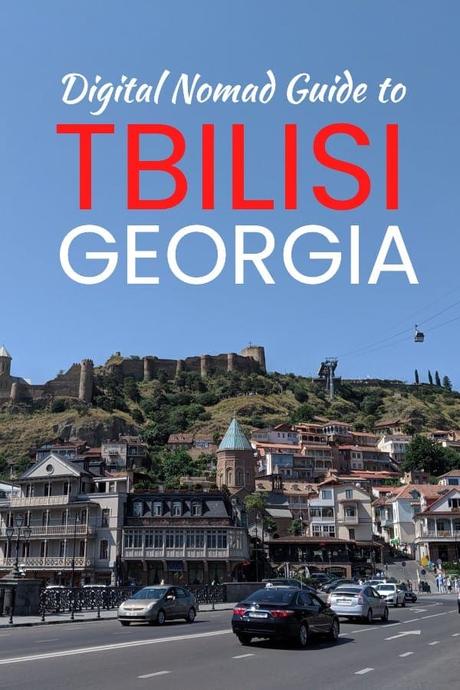Imagine a place that feels like Eastern Europe with a hint of the Middle East / Central Asia. Where you can stay for a year as a tourist. Where you can drink some of the world's best wine for the best prices. Where food, accommodation, and travel costs are lower than most of Europe. Where people are warm and friendly. Where you can enjoy one of the most beautiful regions of the world.
Imagine a destination that was relatively undiscovered but open to foreign investment and international entrepreneurs. A country where it's a simple process to open a bank account or start a business.
That place is Georgia. And I'm not talking about the Deep South state. I'm talking about the tiny Republic of Georgia in the Caucasus mountains, the capital of which is the vibrant & fascinating Tbilisi.
Tbilisi is an Eastern European city right at the center of the Eurasian Continent, the capital of a developing country that has a European Union Association Agreement and a fast-growing economy. It's one of the most talked-about remote work hubs in the world and a magnet for adventurous digital nomads.
Update: late 2022.
I traveled to Georgia in the summer of 2019 and the winter of 2021/2022.
Why Tbilisi is Your next Digital Nomad Destination
My prediction is that in a few years' time, Tbilisi will be a digital nomad hub. Ryanair has already launched direct flights connecting a lot of airports in Europe with Tbilisi and Kutaisi. Another budget airline, Wizz Air, already flies to Kutaisi and is considering flying direct to the Georgian capital from European cities. German low-cost airline Eurowings made its inaugural flight to Georgia in July 2021.
These connections will make Tbilisi more accessible and attractive to location-independent entrepreneurs. The country is set to be a major tourist destination once the Covid-19 pandemic is behind us. There's so much to see in this compact little country and its charming capital.
The country is ripe for a tourism boom and deservedly so. There's so much to see in this compact little country and its charming capital.
✈️ Thai Air Asia X offers direct flights from Bangkok to Tbilisi flights (during normal times). Expect movement between one of the world's major digital nomad hubs to one of the world's emerging nomad destinations. Tbilisi is sometimes called the Chiang Mai of Eastern Europe thanks to the influx of digital nomads looking for a low cost of living.
Ex-president Mikheil Saakashvili has plenty of haters but most people will agree that he cleaned up corruption when he came to power in 2003. Georgia was a corrupt place back in the years after the Soviets withdrew. But that's all changed. Georgia is now one of the easiest places in the world to do business.
There's currently conflict with Russia, and border and a sovereignty dispute with South Ossetia and Abkhazia. These issues affect businesses. Putin's ban on flights to the country negatively affected the tourism industry. This has a knock-on effect for the rest of the economy. Digital nomads can benefit thanks to a weakening Lari but it's not a good climate for business and indirectly hinders the development of infrastructure - which of course, is important for people that work online.
Digital nomads and bloggers will spread the word about Tbilisi and Georgia. With better connecting flights, a stable political situation, and more awareness of the country, Tbilisi will be a tourist destination to rival most other major cities in the region.
Where is Tbilisi?
Tbilisi, the biggest city in Georgia, lies in the east of the country, which sits in the Caucasus mountain region.
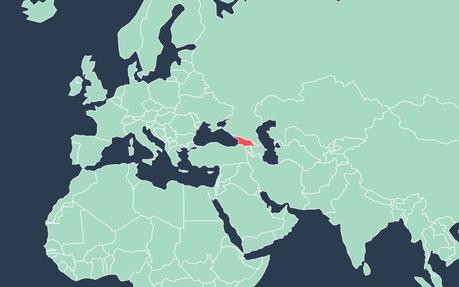
Tbilisi truly sits at the centre of the silk roads and at the crossroads of the Asian and European continent. It was a strategic city for many empires and tribes for thousands of years. Tbilisi's is located at the 41st parallel north, a latitude it shares with Sardinia, California, Portugal, Greece, and Spain.
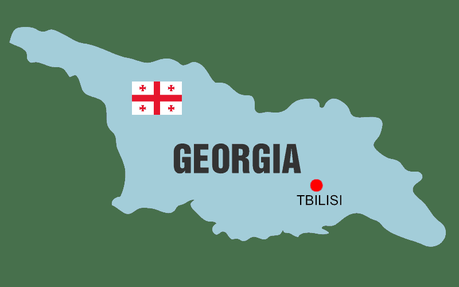
Friendly, Welcoming People
Georgia has a reputation for being a friendly place. On my personal ranking of the friendliest nations in the world, Georgians are certainly up there. But don't expect showy friendliness. Breaking the ice is important. But once you've smiled, asked how someone's day is going, or attempted some Georgian language, many locals will open up. I don't think I've been in a place where a smile and a "how are you today?", get such a warm response. All smiles and genuine curiosity. It regularly made my day. Learn some words of the Georgian language to make your time there more enjoyable and fulfilling.
I don't have an official top ten but Let's say that countries like Thailand, Philippines, New Zealand, and Colombia are in there. I can now add Georgia.
Cost Of Living in Tbilisi
Tbilisi is as cheap as many South-East Asian capital cities. It's on a par with some Ukranian cities. Outside of the Euro zone and with a weak economy, Georgia's Lari has lost ground. Your Euros or Dollars will go a long way here. In the past few years, the exchange rate has improved for visitors so it's still a bargain destination for digital nomads.
Expatistan puts Tbilisi as the 3rd cheapest city in the world based on the website's user-reported price index.
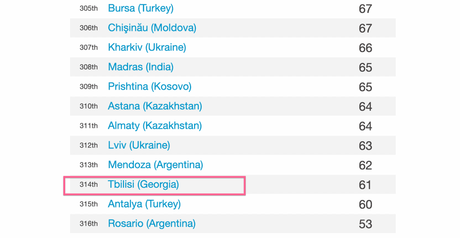
The Mercer Cost of living survey puts Tbilisi as one of the cheapest places in the world in 2021.
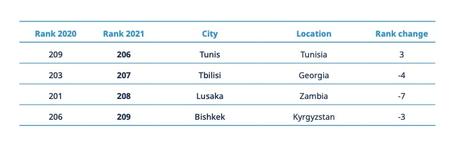
Rib-Eye steak in one of the most expensive supermarkets sells for around €5 a kilo. In Western Europe, a kilo costs between €20 and €30. High-quality Georgian wines sell for €10-15 but you can pick up decent bottles in the supermarket for €3-5.
A meal in a basic restaurant will set you back €2-3 and a three-course dinner in a top restaurant will still come in under €20.
Taxi rides of 10 to 15 minutes cost between €1.50 and €2.50
I found prices overall to be as cheap as those in Bangkok or Medellin for example. Street food in Asia might be cheaper but apartments in Tbilisi are great value compared to the saturated markets of Bangkok, Singapore, and Kuala Lumpur.
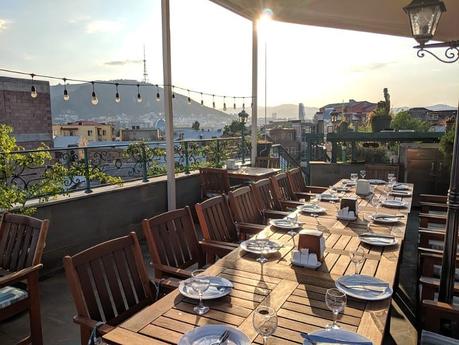
Accommodation in Tbilisi For Digital Nomads
There are plenty of options to choose from and depending on the season, there are some bargains to be had. Renting for anything longer than a week is great value.
Airbnb
Airbnb is the most obvious for stays of less than 6 months. According to Business Insider, Tbilisi has the cheapest Airbnb prices in Europe. At the same, time there are plenty of alternatives to Airbnb.
Here's an example. The entire apartment costs about $400 per month.

Renting an apartment
Speaking Georgian opens a lot more doors (literally) but most of the big apartment rental websites are in the three languages of Georgian, English, and Russian.
I joined most (if not all) of the Facebook groups about long-term rental in Tbilisi. Renting long term is very economical. The prices were very impressive. $400-600 per month will get you a nice (often brand new) apartment in a good location. There are only a few places in Europe that have similar standards at that price.
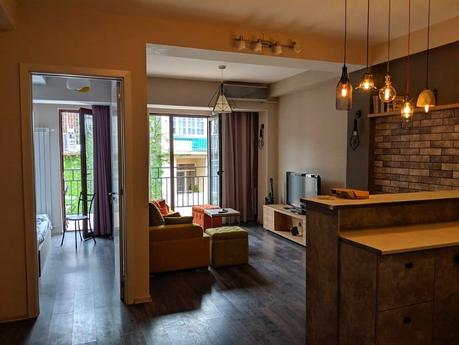
Renting long-term is a painless process in Georgia thanks to the very generous Visa policy and visa-free policies. In fact, at these prices, you could afford to base yourself in the country and spend months travelling to other parts of the region (Turkey, Azerbaijan, Armenia, Russia) or the world.
From what other expats tell me, it's safe to deal with real estate agents and rental agencies. I've only had good experiences dealing with Georgians and never feel like I'm being ripped off.
Where to Stay
There's no best place to stay in Tbilisi. Your choice of short or long term accommodation depends on your specific needs. But the options below will allow you to explore the city and find your favourite area.
Short Term
Airbnb is the easiest way to find an apartment for a week or more. I usually books hotels for stays of a day or two but the advantages of having a kitchen and some local knowledge help for stays of a few days or more.
There are plenty of hotels and hostels in the city, spread across the different neighbourhoods. If you want to be in the thick of the action, try the area south of Vera close to the old town. For a quieter time with more western conveniences, try Vake. For really quiet, Saburtalo is the best option, but it is a little far to travel to the old town for example. To shun the major touristy areas and modern conveniences, the east side of the river offers some cheap places to rent and eat.
Fabrika Hostel is a very popular place among backpackers and budget travellers. The awesome building and surrounding bars and cafes make it a good base location too. Dorm beds start as low as $7 but the hostel also offers twin rooms.
Hotel Tabi is clean and comfortable and located in the old city centre
Hotel Zeg is located in a sweet spot between the river, Freedom Square, and the old town. It's a stylish place and very comfortable.
I have to mention Rooms Hotel Tbilisi. It's a lot more expensive than the options above but definitely worth a look for a night or two. The same hotel in any major European city would cost three times as much. The cafe and restaurant serves delicious local dishes and coffee and the bar is well stocked and staffed by friendly bartenders. The hotel is located in the thick of the action. Check their Instagram profile for discounts. I've seen a few 20% discount codes.
Long Term
Renting an apartment long term is easier in Tbilisi than in most cities I've lived in. There are a couple of accommodation sites worth checking but it's worth contacting an agent who can show you around many apartments in an afternoon. You might pay a bit extra than going direct, but the convenience of navigating the system and seeing multiple apartments quickly might be worth it to you.
Landlords don't ask for deposits for long-term rentals. You pay for the first and last month's rent. The contract is usually for 12 months. Bargaining on price and negotiating a shorter lease is also possible. Anything goes here. If you live and work in places like Thailand or anywhere in Western Europe, you might find this a bit of a welcome change.
Tbilisi Neighborhoods Guide
I was advised to live near the David Aghmashenebeli area in the northeast of the city. My first apartment was very close to the central train station. I can't recommend this area to digital nomads or long-term visitors. There are very few places to eat outside of the main avenue and it's not really close to the interesting parts of the city. If you like Kebabs and Shawarma, you're in luck. There are a couple of Georgian places and that's about it. However, Fabrika Hostel and Impact Hub coworking space are close. Apart from this, it's a bit of a dead zone.
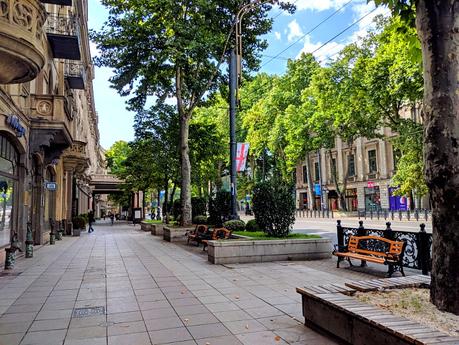
Lots of expats live and work in the Vake/Vera area. The leafy trees offer plenty of shade so it's a good spot for walking around. Not much in the way of public transport but as I mentioned, taxis are relatively cheap. Rents and restaurants are more expensive in this part of town. But the area has a lot to offer: Parks, plenty of coffee shops, and amenities like the Neptune sports complex.
This neighborhood seems fresher and less polluted than anywhere near the river or the centre. This area has some of the best coworking spaces, cafes, and places to work from. It's less a tourist destination and more of a middle-class suburb but it's perfect for the digital nomad life you might be looking for.
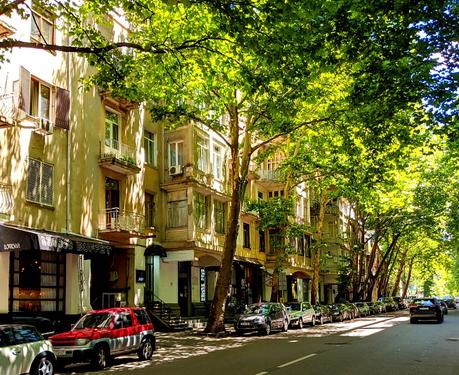
The Old Town area is one of the best spots for a short term visit but is less appealing for long-term. It's a tricky part of the city to navigate, and most services and conveniences are aimed at tourists. The area around the fortress, botanical gardens, and funicular is beautiful and interesting but also the most touristy area.
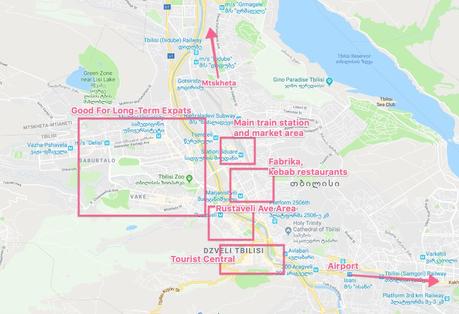
Internet & Connectivity
One of the most important aspects of a digital nomad lifestyle city is the connectivity. It's hard to be location independent and run a business without fast, reliable internet.
Internet
In my experience, good internet is hard to find in Tbilisi. Okay, so it's not terrible, but it might be too slow for power users. If you're uploading a lot of large files, doing webinars and video calls, or streaming videos and courses, the slow speed might frustrate you.
All Airbnb properties have Wifi and most cafes, bars, and restaurants offer free Wifi, often with no password so you can jump on easily. This raises a few security concerns so you might want to use a good VPN for random connections in unknown places. Open wifi networks are easily mimicked by hackers.
Mobile Phones
Mobile phone plans are inexpensive and you can pick up a SIM at the airport - you need your passport to get a mobile SIM so you might as well buy one there while you have the passport to hand.
If you're spending any longer than a week in the country, get an Unlimited Plan SIM. A month costs around 40 GEL ($15). WiFi is available in most places but I wouldn't rely on it. If you want to use taxi apps like Bolt, then a mobile plan is essential.
Here's a list of GEOCELL offices in Tbilisi in case you want to buy a SIM there or top up:
Other popular and recommended providers include MagtiCom and Beeline. They all charge similar prices and cover the same areas in and around Tbilisi. If you plan on doing some travel around Georgia, look further into the coverage maps of each provider (or grab a second SIM).
The easiest way to top up or recharge the mobile phone plan is at the self-service kiosks around the city. Look for the big orange ATM-style machines in supermarkets, malls, and shops.
Local calls cost about $0.05 a minute.
I used Geocell which worked really well and I currently have a Magticom subscription with unlimited internet. I had coverage almost everywhere, even in the mountains of the Kazbegi region.
Visas
Georgia has the easiest visa policy in the world: 1 year, no questions asked (as long as your country is on the quite extensive list) visa-free access for most Western countries. In effect, you could stay here forever. That might be music to the ears of nomads in places like Thailand, or for US citizens looking to spend a longer period "near" Europe.
In 2020, in response to the Covid-19 situation, the Georgian government introduced a digital nomad visa program called Remotely From Georgia with the aim of attracting remote workers and digital nomads while travel restrictions were in place. Georgia's popularity as a destination was poised for a huge spike in growth when the pandemic hit and shut down this valuable source of revenue.
As of February 2021 "All foreign visitors to Georgia can freely enter the territory of the country if they provide COVID-19 vaccine certificates saying that they have received two full doses of vaccines." Non-vaccinated visitors from certain countries (mostly EU) will not need to isolate if they have a recent PCR test. Full details on the Remotely From Georgia programregistration website.
Tax For Nomads, remote Workers, & Foreign Citizens
Georgia is becoming popular as a place to do business and set up residency from a tax point of view.
Why is Georgia a popular place to become a tax resident? Well, the easiest answer is that income earned outside of Georgia is not subject to taxation.
The team at ExpatHub.ge has created detailed guides to tax for freelancers, individuals, and companies in Georgia. There's also information on remote working in Georgia, tax resident status, digital nomad visas, and how you can legally pay only 1% tax as a remote worker in the country.
It's fairly easy to establish tax residency in Georgia. Just stay for longer than 183 days in the country in any 12-month period. If your annual income exceeds USD $90,000, you don't even need to spend the 6 months in the country. You can apply as a high net worth individual. (Note: there are a few other boxes to tick on this application but the Georgian government has tried to make things as easy as possible).
Kathleen Di Paolo of Wanderers Wealth, a tax expert that wants to empower Digital Nomads, Freelancers, Expats and all other Wanderers of the World with financial freedom, has this to say about Georgia:
"Obtaining temporary residence in Georgia, which can be extended and eventually used to obtain permanent residency, is a relatively easy process for any person willing to make an investment or start economic activity in the country.
Further, Georgia applies a territorial tax system which means that individuals are taxable only on Georgia-source income.
Georgia is also one of the easiest places to open up a bank account (although this is becoming more difficult)
In short, Georgia's fast and simple incorporation process, low-tax regime, easy banking, together with its strategic location, low labor and living cost, and an easy residence permit, make Georgia a very attractive jurisdiction for Digital Nomads to live in. "
Georgia is a low-tax country but as always, there are caveats and gotchas. Setting up tax residency in the country is a good choice for some people but not for others. Every situation is different. Consult a tax expert who understands your digital nomad lifestyle or your expat situation.
To sum it up:
- A 0% foreign earned income tax rate
- Ease of business rates one of the highest in the world
- Personal income tax is 20%
- The corporate income tax rate is 15%
- Tax on dividends is 5%
Combine this with the low cost of living and Georgia becomes an interesting country for digital nomads.
Of course, you need to balance this against the fact that the country is not in the EU and is relatively unknown in international financial circles. Services like Stripe for payments do not operate there and a Georgian bank account is not as trusted as, say, a German bank or even a Bulgarian bank. However, 83% of Georgians wish to join the EU and the Georgian government is making real efforts towards joining.
Links:
The Georgian Revenue Service: https://www.rs.ge (English version available)
The World Bank's Ease of Doing Business Ranking is 2 years old but the details are sound and still very useful for planning your tax strategy. There's also a Benchmark tool for comparing Georgia with, say, Estonia or Bulgaria. Georgia is ranked 6th in the world.
Getting there and onward connections
This is one area where Georgia falls down in the digital nomad ranks. It's a brilliant place to live and work as a digital nomad but if you want to hop over to another country, it can be a bit of a slog.
Many (most?) international flights are scheduled to leave between 3 and 5am. Georgia is a not a hub and even the capital, Tbilisi relies on connections in Istanbul and to some extent Kyiv, Ukraine.
Even flying to Istanbul direct means doing an overnighter.

And then you've got stopovers and missed connections to factor in (the voice of experience talking - 8 hours in Istanbul airport at night in between flights will wipe you out for a day or two). As you can see, Tbilisi is not quite a jet-setting, city-hopping base location for digital nomads.
Flying to Baku is not a problem, although if you're used to cheap flights around Europe with the likes of Ryanair and Wizz Air, the cost of a 1-hour flight might sound a bit steep.
It's equally easy to get to Ukraine (another former Soviet bloc country) but the cheapest flights sometimes require a stopover in Turkey.
Armenia to the south is easier to access by road than air, with the 30-minute flight costing upwards of USD $250 all year round.
Wizz Air is just about to launch flights to Tbilisi from all over Europe. Currently, the airline flies from around 30 locations in Europe direct to Kutaisi (including as far away as London Luton airport). However, Kutaisi, as pleasant as it is, lies 3 hours away from Tbilisi by taxi.
Public Transport & Travel Guide
Tbilisi has a metro, tram, and bus network as well as a plentiful supply of taxis.
Metro
The Tbilisi Metro system is cheap and trains are frequent. I found it a little confusing to navigate at the main train station metro stop but apart from that, it's a good way to get around if you're not pressed for time. A ticket costs just a few cents. The slowest part of a metro journey is descending and ascending to the platforms (the tracks are deep - almost as deep as those in Kyiv) and waiting on the trains to arrive.
Taxis
You'll never have a problem finding a taxi. I find it better value and more convenient to use the ride-sharing app Bolt. Fares are incredibly cheap compared to most Western Cities and there are plenty of drivers waiting to take you anywhere from the airport to the old Georgian capital of Mtskheta, as well as all around town.
If you plan on doing some tours around the area, take a few bolt taxis and when you find a driver you get along with, ask for their rates to all the places you want to visit. Off the clock, it can work out cheaper. As an example, I hired a Bolt driver (off the clock) who brought me to Mtsheka and waited for a couple of hours in town while I did my touristic stuff. We also went to the Jvari Monastery and a couple of other stops for epic Georgian travel photos. Then we drove back to Tbilisi. The journey cost about $7 each way. More expensive than local buses, of course, but much more convenient.
You'll save $10 on a local bus but you'll spend a lot longer getting around and you can't stop for photos.
Older drivers seem incapable of following the Bolt app GPS map, or at least they don't like using it. The app shows them where to go but they still ask for an address. Cue the dramatic throwing of hands up when they've never heard of your destination. You can point out that the driving instructions and locations are clearly presented on the app that drives all of their business but this won't get you far. Tell them the name and number of the street or a landmark.
Uber is not yet operating in Tbilisi and it doesn't look like it will. Bolt and Yandex work well here so there's no real need for another provider.
E-scooters
Escooters, Electric scooters, or e-scooters. Whatever you want to call them, you'll see lots of them scattered around the streets of Tbilisi. They're not only efficient and cheap to rent, but they're great fun too. And as they are electric vehicles, they run silently and are non-polluting. In a fairly noisy and polluted city like Tbilisi, I think we can call get behind that.
Check out the Bird App on the Apple Store or Google Play. This will give you access to the largest range of vehicles. There's generally a 1 GEL fee to start the scooter and 0.45 per minute after that.
Local buses
Buses are an uncomfortable way to travel in the heat of the Georgian summer. But they're cheap. However, metro and taxi fares are also cheap so unless you're looking to really save costs, this might not be the ideal mode of transport,
Walking
Being a big fan of walking and exploring a new place via my own steam power, I walked a lot in Tbilisi. With all the steep streets it's not a place for casual strolling. The only real flat areas are near the river, but that's also where the traffic rolls by all day, and most likely the most polluted area of the city.
Cycling
Spend a day walking the streets and see how people drive. Then realize that cycling is an extreme sport and you're not ready to die yet. (I love cycling, just don't like getting smashed by cars)
Car Rental
If you're adventurous, renting a car is a great way to get around the country, if not necessarily around Tbilisi. Myrentacar offers good rental options in Georgia and other less-frequented world destinations (including neighbouring Armenia). Europcar also operates in Tbilisi and is generally offers one of the best rates for car hire anywhere.
Safety
Tbilisi is safe. Very safe. Probably safer than your own country (unless you're from Singapore) most likely. Georgia ranks 49 th safest country in the world by Global Finance magazine. The country is in position 99 in the Global Peace Index.
These rankings all use different criteria so it depends on how you view safety. There might be a conflict in a tiny part of the country and this has the effect of tanking the rankings. But the capital city could be as safe as Disneyland. This is likely the case with Georgia. Tbilisi is safe, but there are border areas of the country (Abkhazia and South Ossetia) which drag the countries rankings down.
Road safety is probably your biggest worry. Georgia has one of the world's worst records for road traffic deaths. According to OECD data, it is, in fact, the most dangerous country to be a road user.
You'll see plenty of dogs and cats roaming the streets but most are harmless. Georgia tags all its dogs. I started to see these little coloured discs on the ears of dogs that otherwise looked like strays. But a tag means the dog has been vaccinated and neutered. Aggressive dogs are eventually tracked down and removed.
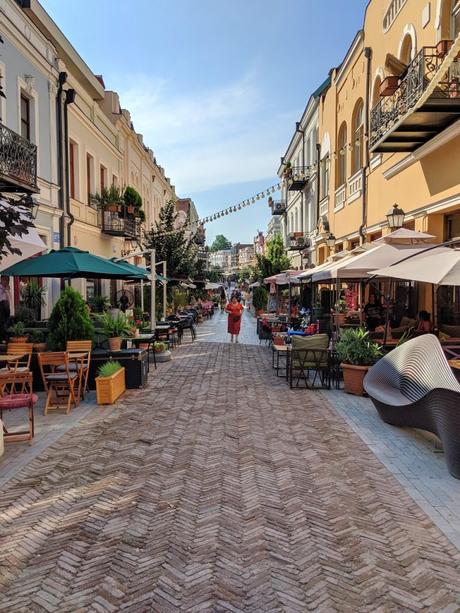
Digital Nomad Cafes
There's no Starbucks in Tbilisi. 😀 So, here are the best coffee shops for working in Tbilisi:
Pin Pon Cafe Bar
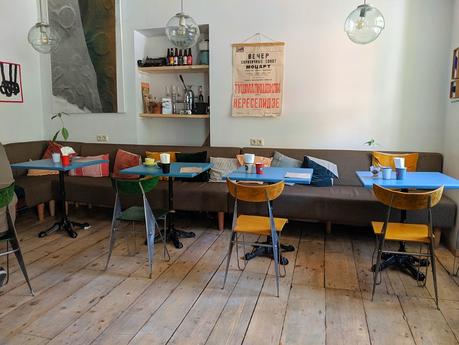
Located below the Mother of Georgia statue on Lado Asatiani St, a few blocks from Freedom Square. Nice selection of coffees and teas. Comfortable setting.
Adress: 13 Lado Asatiani St
Entree
Entree chain of cafes has a few options dotted around. The one in Marjanishvili square (right beside Discovery) has around 10 tables. Not the best chairs or working from though. Typing while banging your elbow off the curving backrests isn't going to make you work better (first world problems, I know). There is a space near the door for standing and working (it's quite small though).
One point in favour of this place is the wifi speed, which was the fastest of any cafe I checked. A decent 69MB download speed means you'll be able to stream Netflix in that cafe and avoid work 😉
Address: Marjanishvili Square
Stamba Hotel Cafe
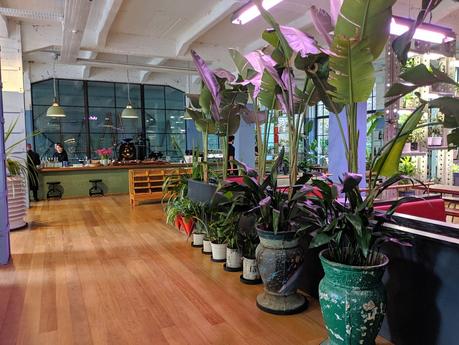
Whenever I travel to a new place, I look for hotels with cafes. I'm not sure why more people don't use hotels over coffee shops. Hotels offer better service and often similar prices or cheaper than the local coffee places.
The absolutely gorgeous Stamba Hotel in Tbilisi is no exception. The converted soviet worker factory is now a high-end hotel with a great cafe. Expensive? No. In fact, and American coffee here is cheaper than pretty much anywhere else at 3 GEL (about USD $1.20)
The cafe opens at 6 am or 7 am depending on who you ask so it's a good place to head to for early workers.
Stamba Hotel is also an excellent, if expensive, place to stay.
Address: 14, 0108 Merab Kostava St
Lokal Tbilisi
Lokal is a fairly new coworking and coliving space created by digital nomad Candy Treft. It's very popular with the nomad community, remote workers, and expats. They run game nights, masterclasses, and group trips too so it's definitely a good choice for people who want to network or meet people.
Fabrika Hostel Cafe
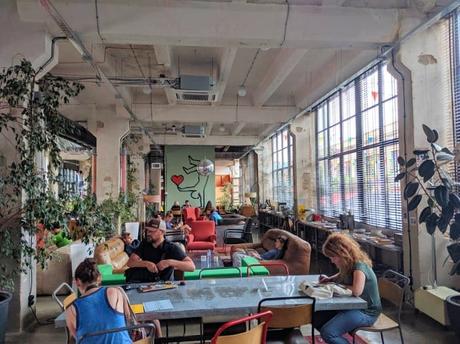
Fabrika Hostel is where you'll find a mass of people on MacBooks or wandering around taking selfies. It's a comfortable place with different types of seats and tables. The cafe is on the first floor of a cool, renovated building on the East side of the river. Coffee is pretty good and they also sell beer. Outside you've got a selection of bars and restaurants. The wifi is fast and reliable. A cowork space feel will make remote workers feel at home.
Address: 8 Egnate Ninoshvili St
Paul Restaurant
Located a stone's throw from Freedom Square, Paul Restaurant is a good spot to work from. The coffee is a little more expensive here but it's worth it. If you want some delicious pastries to munch on while working, Paul has arguably the city's best selection.
The internet download speed hovered around 7MBs (on multiple visits), but somehow, it felt faster than in my apartments which never got above 10MB. I guess I'm spoiled, coming from Western Europe with speeds of 200MB.
Address: 3/5 Galaktion Tabidze Street
ViceVersa Coffee shop
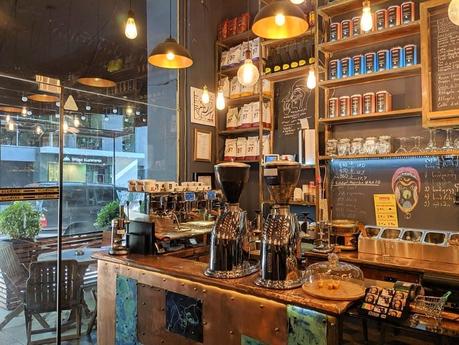
Vice Versa is a great-looking place in Vake built to look like an Italian espresso bar. The copper-coloured tables and fittings really add something that the likes of Coffeesta (Georgia's version of Starbucks) lack. The grumpy barista became super friendly once I started asking a few questions. The coffee is truly excellent.
Inside the cafe door, there are high-tables and high-stools. Towards the back, you'll find seats and tables with subdued lighting. It's not a big place so it might get a little crowded. The cafe is located right in front of Terminal coworking space.
Address: 29 Irakli Abashidze Street
CoffeeShop Company
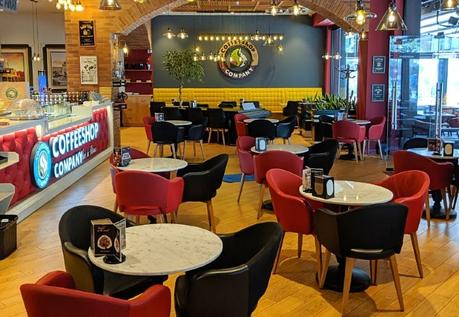
Big place with plenty of space indoors and outdoors (covered). Largest selection of coffees and teas: Try the ginger, honey, lemon and cinnamon tea.
Address: 11 Ilo Mosashvili St, T'bilisi
Prospero's Books Coffee Shop & Bookstore
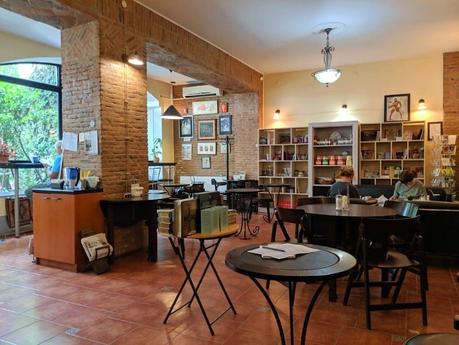
One of the most popular cafes in Tbilisi for digital nomads, Prospero's doubles as a bookstore. If you're looking for any kind of guidebook or literature on Georgia in English, this is the place to shop. This is a peaceful place to work from. The coffee is not as good as it could be.
Address: 34 Rustaveli Ave, T'bilisi 0108
Erti Kava
A cool little coffee shop a couple of blocks off Rustaveli Avenue. It's on a nondescript street up a hill, as almost everything is heading away from Rustavelli. The coffee is delicious, and the decor is bright and cheery. There aren't too many seats so pick your moments to visit. It's also another kid-friendly place so keep that in mind if you need to concentrate.
The cafe's wifi speed was slow, but nothing out of the ordinary for Tbilisi.
Address: 8 Mitropan Laghidze St
Coworking in Tbilisi
If you prefer to do work in a space designed especially for location independent workers, coworking spaces can be very productive environments. They can also be a waste of money, so don't sign up for anything before you understand what you're getting. It's important to find one that suits you. Many remote workers and members of the digital nomad community hang out in coworking offices around the city so they can be a good place to meet people.
Prices are high compared to the cost of living in the city. The owners of these co working establishments could be aiming to attract remote workers and digital nomads rather than local freelancers and entrepreneurs.
Terminal Vake
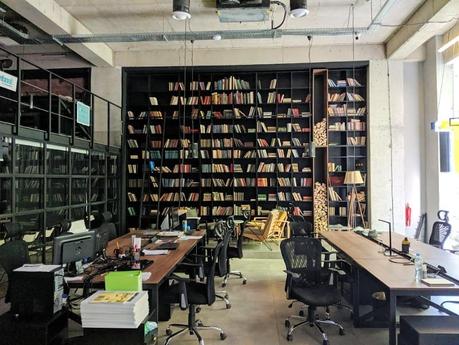
Terminal is a nice coworking space set across a few floors and staggered levels. I was impressed by the tasty decor, subdued internal lighting, and use of natural light. There's an outdoor area, a cafe, and many private rooms, and even a large conference room or meeting room.
The office is open 24/7. There are no standing desks apart from one tall table outside.
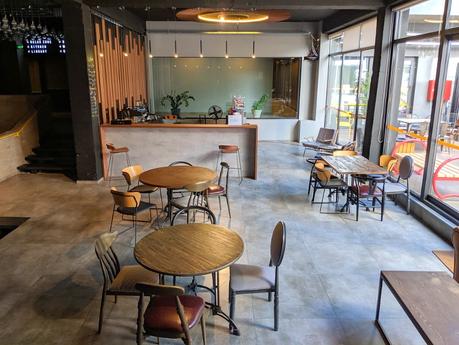
Terminal Vera
The second outpost of this "chain" of coworking spaces. I use the word "chain" lightly as there doesn't seem to be much connection between the two. Same company but you can't use your monthly pass interchangeably between locations.
Another beautiful coworking office with fast internet, meeting rooms, and comfortable seats.
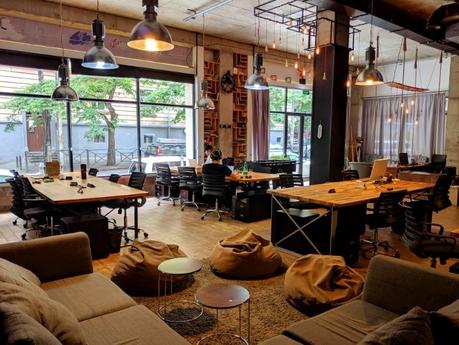
Impact Hub
This coworking space didn't impress me, despite its popularity and location inside the excellent Fabrika building. I'd like to be transparent and say that I did not use the facilities.
I didn't check the wifi here but as soon as I walked in I knew it wasn't going to be a place for me. But there were plenty of people working away and I'm sure they were quite happy to be there. It was deathly quiet as most people worked while listening to headphones. If you like super quiet places to work, this might be just the thing for you.
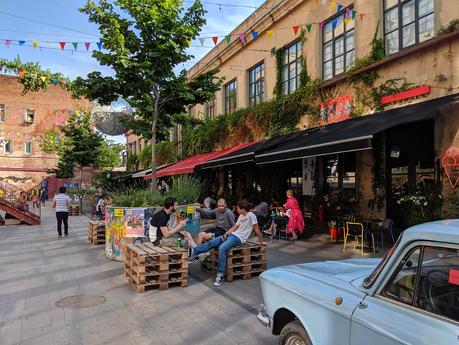
One benefit of Impact Hub is that the company organises events (as it does in other cities around the world) and is more deeply involved with the startup community than other coworking businesses. You also have a great cafe in Fabrika and a street full of bars and restaurants to choose from right outside the door. It's also a host for Tedx events.
Most nomads will probably choose the west side of the river to live on, so that means making your way over to the east. It's not that complicated but for people that like to put as few barriers to getting to work as possible, this might be an issue.
Impact Hub Tbilisi gets 5-star reviews on Coworker, Facebook, and Google, so it's good enough for a lot of people. I'd recommend checking it out for a day and making your own mind up.
Art House Tbilisi - The Place To Meet
Art House is not labelled as a coworking space but it's one of the best locations for working in the whole city. And nobody knows about it. I could review this place in the "cafes" section but it resembles a coworking hub much more than any cafe in Tbilisi.
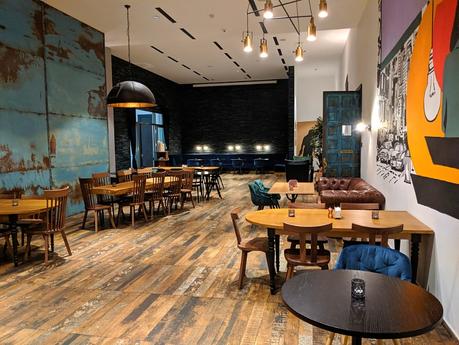
This is a multi-level complex with a restaurant on the bottom floor, a Gym and a pool.
Art House will soon be buzzing with people from Georgia and all over the world. A perfect spot to catch up with acquaintances and meet new friends.
The second floor splits into a bar kitted out in comfy leather couches and subdued lighting. Perfect for doing some deep work.
The other part of this floor is a cafe with artwork and murals on the walls. It feels more like a hotel cafe. Coffee is cheaper here than it is in the high street and at the moment, you'll have the place to yourself. Friendly staff and a great choice of drinks and snacks make this place a must-visit for anyone thinking of working from a cafe in Tbilisi.
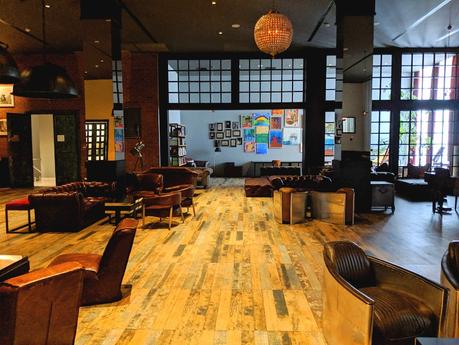
Networking & Connecting with businesses and nomads
Expats in Tbilisi
Check out the Tbilisi Digital Nomad Facebook group for discussions by expats and digital nomads. It's a great way to get accommodated and find answers to help you navigate this great city
The Tbilisi American Business and Networking club Facebook group sometimes runs events with subjects like "Georgian Business Dos & Don'ts" which can be useful for people thinking about or already running a business in the country.
Events & Meetups
A new website for events in Tbilisi promises to be a great resource for culture vultures. Check out Today in Tbilisi. Make sure to sign up for the newsletter to get a twice-weekly list of what's happening in the city.
Many businesses prefer to use Facebook instead of a website. I don't think the news about Facebook's awful organic reach and poor usability has reached Georgia yet.
If you check out the Facebook page of a local business, you might find some stuff in Georgian written six months ago. And the opening hours will be a mere guideline. Best to use Google Maps for more up-to-date opening hours. Even the business location is often incorrect - be aware when you're looking for a place.
Despite my issues with the platform, Facebook is one of the best places to find events in Tbilisi. As I mentioned, websites come and go here. Most are neglected. Facebook groups aren't great either but many event organisers put their show, yoga class, travel event, bar crawl, or otherwise on Facebook as an event. When you search Tbilisi on a particular day, you should get a list of current events with up to date start times and attendees (at least the ones that publicly announce that they will attend)
Meetup.com is not very active in Tbilisi among Georgians or travellers. In 6 weeks I found nothing of interest. However, the Couchsurfing website has an active events section. You don't have to be a guest or host to take part in the events.
Fabrika Hostel runs cultural and fitness events regularly. They also host meet-ups and a few high-profile paid events.
The Tbilisi Opera house is a beautiful 170-year-old Opera building on Shota Rustaveli Ave which also hosts the ballet. Well worth going to an event.
Internations runs a few events every month and draws a decent crowd. The majority of the people are expats or long-term business people living in Tbilisi. But there are also random travellers and digital nomads in attendance. It's also worth heading along just to visit some event locations, like the Biltmore Hotel.
A note about connecting with businesses:You can expect over 50% of your emails to bounce. I spent 5 weeks in the country emailing different companies and services and the rate was more like 80% (but I'd like to think that this was exceptional). Unfortunately, email as a way of communicating appears to be an afterthought, even for government departments.
Health
Air pollution can reach dangerously high levels in Tbilisi and a few other industrialized towns in Georgia. And sometimes you can really sense when the air quality has dropped. Tbilisi sits in a valley and there's quite a bit of traffic, so the air can feel a little heavy. Occasionally the air "tasted" dirty. And my eyes were starting to look red after a few days.
Use the Georgian government's Air Quality Portal website to get up-to-date reports. Note that the site goes offline from time to time.
The majority of the pollution in Tbilisi comes from car exhausts. The city ranks one of the worst in Europe for tiny solid particulate matter (PM10 and PM2.5) which contribute to increased respiratory symptoms, such as irritation of the airways and coughing.
Cambridge Masks use filtration technology to filter out harmful dust, pollution, bacteria, and viruses. These are heavy-duty masks, but they stop nearly 100% of smaller particulate matter such as PM2.5 and PM0.3, gas pollution such as Volatile Organic Compounds (VOCs), Ozone, Benzathine, and Formaldehyde. So if you find yourself getting headaches and having breathing issues, try one of these. I use one during the heaviest pollution days in Tbilisi.
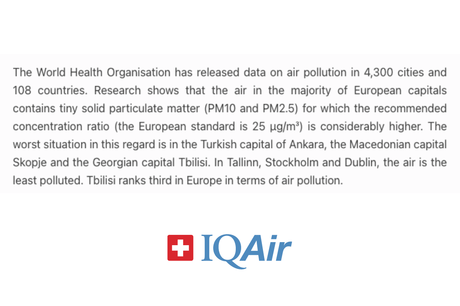
You'll never be more than a few seconds standing beside a man in Georgia before he's enveloped in a cloud of smoke. Everyone (especially the men) smokes here and it can get a little frustrating. Expect to breathe in the passive smoke of the marshrutka drivers or the 20 other guys walking ahead of you in the street.
Gyms
Gyms are fairly common throughout the city, especially in the areas where expats live.
Champions Academy is a huge, multi-level gym located at the top of Aghmashenebeli Avenue, near Queen Tamar Avenue. The gym is open from 7 am every day.
Champions Academy charges 160 GEL for one month (€52 or $58)
A day pass costs 20 GEL ($7-8) and gives you access to pretty much everything.
The Georgian national rugby team trains here so you can be sure that the facilities are pretty good. There are 4 levels and even a CrossFit-style level where you can push sleds, jump boxes, and do CrossFit-y stuff to your heart's content.
Champions Academy - 150 Davit Aghmashenebeli Ave
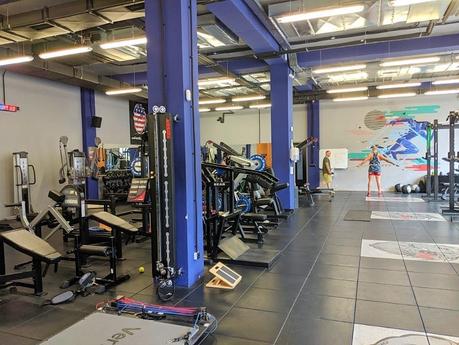
Neptune Sports Complex is a massive place with an Olympic swimming pool and gym.
The complex also runs classes in Latino Fitness, Pilates, Yoga, and aqua spinning (whatever that is).
An Unlimited visits pass for one month costs 350 GEL ($120 USD)
Neptune Sports Complex - 49a Chavchavadze Avenue
Urban Garden - Khimshiashvili Street N3. A modern gym with monthly memberships for about $35
Yoga
The most impressive-looking yoga studio (called Yoga cave) unfortunately, does not offer classes in English. This despite having a website in several languages and staff that speak English well.
Fabrika Hostel hosts open-air yoga sessions on their lovely rooftop every week. This is well worth attending if only for the views and social aspect. They also run tango classes, movies, and other events.
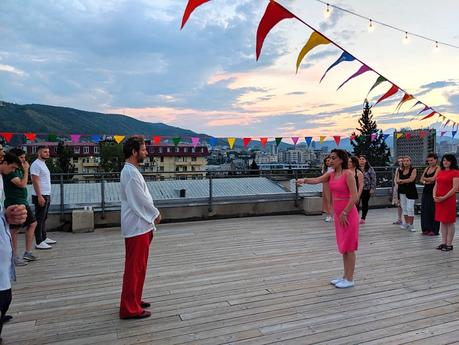
Note that some studios close during the hottest months.
Outdoor sports
If you're into skiing, you're in luck. With some ski fields just a couple hours from the capital and lift passes as low as a couple of dollars, Georgia is a super budget location for snow sports.
Vake Park is a great place to do some jogging or walking. There's also a small street gym inside the park.
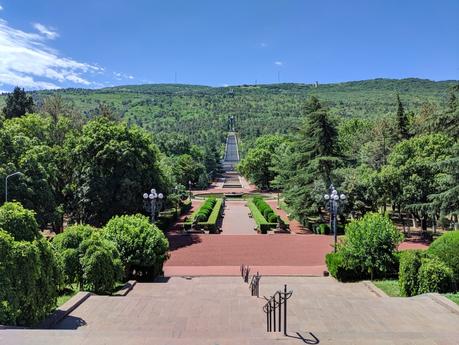
If you want to stretch those legs, the hills around Mtatsminda Park, Mother of Georgia and Narikala fortress are great for walking. There are trails between landmarks and you'll enjoy stunning views of the city.
Weather & Climate
Tbilisi gets hot in summer. Expect most days to hit the 30C mark or higher. The climate is normally reasonably dry but the humidity can creep up from an average of 50% to a less tolerable 80%.
As the city sits in a valley, the air can feel oppressive at times, especially when there's little wind. It's not helped by heavy traffic moving up and down both sides of the Kura River. I felt a similar effect in Medellin, another valley city with heavy traffic.
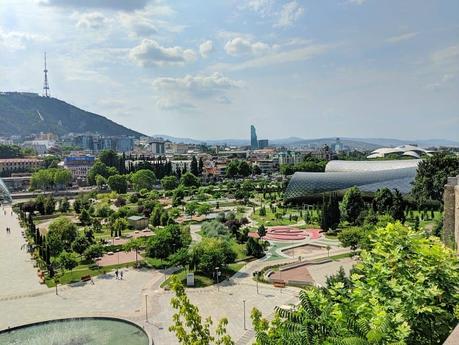
July is one of the wettest months and the second hottest.
On one occasion during my stay, wild storms hit Tbilisi and the following morning temperature dropped to 14 C (57 F). This, after a week of highs of 38 C (100 F).
If you want to avoid the hottest temperatures but still get plenty of sunshine, September is a great time to visit. It's also one of the harvest months at the vineyards, an important local cultural event in Georgia.
Locals tell me that snow is rare in the city but the hills above Tbilisi get a covering of snow for some weeks. Temperatures dip below zero in winter (December to February) but it's a lot warmer here in winter than Eastern European cities such as Bucharest, Kyiv, or Sofia.
Food And Drink
This is one of the best countries in the world to drink wine and the beverage is deeply rooted in local culture. Georgian wine, in all its varieties, is delicious and ridiculously cheap. The beer, by western standards, is very cheap too.
Read more about Georgian wine.
Georgians also drink Chacha, which has nothing to do with the dance of the same name. It's a type of potent brandy, and after a few glasses of this stuff, the only thing you'll be doing is lying down. It's also an acquired taste.
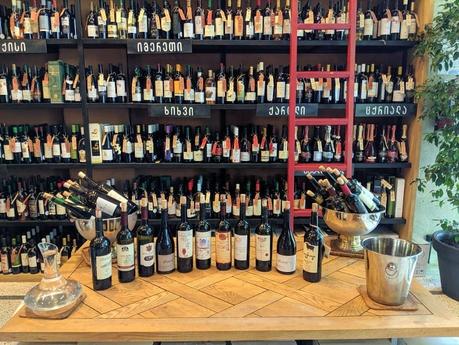
I'll say it: I don't like Georgian food. Apparently, I'm the only person on the planet who doesn't. And I know a lot of people will wrinkle their noses at this. I dare you to find a blog that doesn't gush about the wonders of Georgian cuisine. And there are plenty of vegetarian options.
However, the restaurant scene is superb. There are some truly interesting and impressive eateries in the city. This guide to The 21 Best Restaurants & Bars in Tbilisi by Nathan, the Foodie Flashpacker, will do the local food scene more justice than I ever could. Feel free to ask me about Georgian wine though 😉. And check out his guide to Traditional Georgian Food.
If If you're looking for a knowledgable guide to local food places and wine bars, Paul Rimple at Meet Me Here Tbilisi tours is your man. Paul is a journalist and foodie who'd lived in Tbilisi for decades. I can attest from experience that you'll learn a lot about the food and wine culture of one of the world's most fascinating cities from Paul.
If you want to eat at home but don't feel like cooking, use one of Georgia's delivery apps to get deliveries from restaurants all over Tbilisi. Glovo [Use code 9BS4JDFto get 18 GEL off your first order] and Wolt have most of the main restaurants covered.
Georgian cuisine could be described as a blend of Eastern European and Middle Eastern cuisines (with some Russian thrown in). Of course, the country has its own culinary traditions but it's also been influenced by neighbors and conquering powers.
A huge food market called Dezertir Bazaar near the central station opens every day from early and has hundreds of vegetable stalls. But pretty much everyone is selling exactly the same thing: tomatoes, peppers, eggplant, some other greens. If you like those vegetables, this is a great way to get cheap produce. The meat stalls made me queasy.
How is the meat? Tough as nails and super lean (tasteless) is the preferred style. BBQ meat with no fat and flavor is super popular.
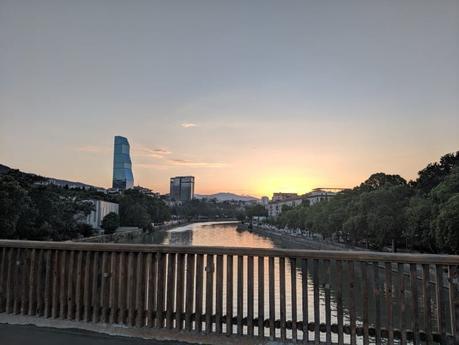
Digital Nomad Tbilisi Pros & Cons
Looking for a quick way to evaluate Tbilisi as a digital nomad destination. These pros and cons might help:
Pros
- Cheap accommodation, local food, public transport, Internet. One of the best value digital nomad destinations in the world.
- 365-day visa-free access on arrival
- Welcoming environment for tourists, expats, and nomads
- Ease of starting a business
- Ease of opening a bank account
- Good interest rates on savings
- Low tax for businesses
- Easy access to the rest of the country from Tbilisi
- Growing coworking scene and vibrant cafe scene
- Friendly locals with a good level of English
- Close to the stunning Caucasus mountain ranges (2-3 hours), wine-growing regions (1-2 hours), and the black sea coast (5 hours).
Cons
- (Relatively) expensive coworking spaces
- Air pollution can be high
- Inconvenient flight connections.
- Traffic and dangerous driving can make life stressful
- Not LGBT friendly
- Can be very hot in Tbilisi and low lying areas of the country in the summer
- Small startup scene
- Not a walkable city
- Few meetups and nomad networking events
- Expensive electronic products and imported goods
Whatever you do, give Tbilisi a try. Visit Georgia and experience one of the most beautiful countries on earth and one of the most beautiful cities in the world. A great place to live and a hot nomad destination to keep an eye on.
Frequently Asked Questions
Is Tbilisi cheap?
Tbilisi is one of the cheapest cities on the planet. Compared to Western European capitals, Tbilisi is anywhere from 50% to 80% cheaper. It's a great value destination to work remotely from.
What is the average salary in Georgia?
According to Invest in Georgia, the average salary is just over USD $400. The most expensive city in the country is the Georgian capital, Tbilisi.
Is Tbilisi Safe?
Tbilisi is a safe city. According to the Overseas Security Advisory Council, crime in Tbilisi is comparable to a moderate-sized American city. Traffic safety is probably the main concern. From a safety standpoint, it's a great place to live.
The most practical and safest ways to travel in Georgia are
Can you drink tap water in Tbilisi?
Non-locals should avoid drinking from the faucet. Recently arrived visitors may experience tummy upsets from drinking water from taps.
Do they speak English in Tbilisi?
There are three main languages in Georgia: Georgian, Russian, and English. English is fast becoming the second language, especially with younger people in the city centre.
How easy is it to get a visa for Tbilisi?
Visas for the Republic of Georgia are relatively easy to obtain and are very generous. Citizens of most Western countries can stay for up to one year (365 days) visa-free
What's the wifi like?
It's not amazing. But it's not terrible either. Work from a coworking space if fast wifi is a priority.
What is Tbilisi close to?
The Caucasus mountains (Kazbegi region), wineries & vineyards (Kakheti region), beaches (Batumi), and the borders of Turkey, Azerbaijan, Armenia, and Russia.
Is there a digital nomad community in Tbilisi?
There are several Facebook groups, Couchsurfing meetups, and events organised by the city's coworking spaces that bring together the Tbilisi nomad community on a regular basis.
